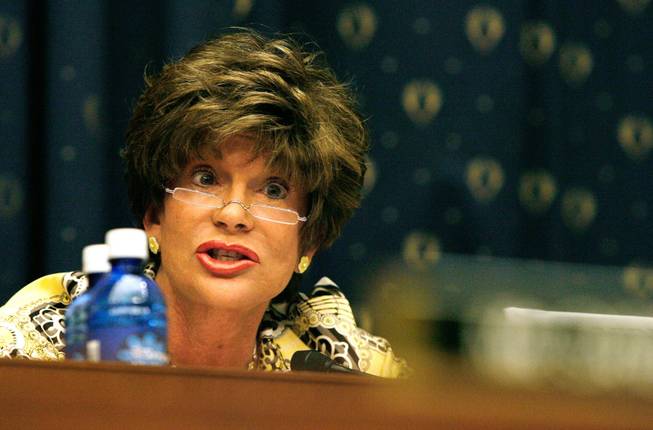
MAISIE CROW / SPECIAL TO THE SUN
Rep. Shelley Berkley of Nevada asks questions Tuesday, June 24, in Washington, D.C., during a House of Representatives hearing on whether Nevada OSHA is failing to adequately enforce construction safety rules. The hearing focused on a death at the CityCenter project in October.
Wednesday, June 25, 2008 | 2 a.m.
Federal Hearing Focuses on Vegas
The U.S. House Education and Labor Committee took aim at OSHA on Tuesday, citing the recent fatalities at construction sites on the Las Vegas Strip. After hearing testimony from OSHA's Assistant Secretary of Labor, Edwin Foulke and Las Vegas resident George Cole, among others, the committee took OSHA policy to task and was joined by Nevada Congresswoman Shelley Berkley who also expressed concerns.
In Today's Sun
- OSHA oversight in question (06-25-2008)
- For family, hearing provides some comfort (06-25-2008)
Sun Topics
Sun Archives
- Five minutes to save lives (6-24-2008)
- High-rise death mystifies family, officials (6-21-2008)
- Worker injuries being suppressed, report finds (6-20-2008)
The following are excerpts from two exchanges between lawmakers and witnesses at Tuesday’s hearing. They have been edited for space and clarity.
Rep. Shelley Berkley questioning George Cole, the retired Las Vegas ironworker whose brother-in-law died after falling 59 feet at CityCenter.
(Federal OSHA requirements say that a safety floor should have been in place no more than 30 feet beneath Cole. But an interpretation of that requirement OSHA issued six years ago allows contractors to avoid installing the flooring. Fines assessed the company by OSHA for violations were later eliminated.)
Berkley: Do you believe, and I know this is a difficult question to answer, your brother-in-law might be alive today if OSHA had enforced the current standard and not the interpretation?
Cole: Mrs. Berkley, I know for a fact of an ironworker who is alive after a 30-foot fall. I don’t know one on a 60-foot fall.
Berkley: How did you and your wife feel when you recognized OSHA had completely dropped the penalties?
Cole: We were devastated.
The committee chairman, Rep. George Miller of California, questioning Edwin Foulke, the head of federal OSHA, about Nevada OSHA’s practice of reducing or eliminating fines after meeting privately with companies that have violated safety regulations.
Miller: There was a preliminary fine, as I understand it, and then there was a decision to remove that fine later on.
Foulke: That’s my understanding.
Miller: So you went from a preliminary fine ... And then later it was determined it was the entire fault of the worker and no fine was issued.
Foulke: We don’t have jurisdiction over Nevada OSHA, so I don’t know what was involved in negotiations. If they determined they didn’t have the evidence to support the violation, or not, I don’t know.
Miller: In the case that I cited in testimony and that is laid out ... in the Las Vegas Sun, time and again, there are assessments and fines ... and time and again after ... private meetings between the employer and Nevada OSHA, those fines are substantially reduced or waived. You have no authority to look at that enforcement to see if that’s sufficient or not, absent questioning the whole program, is that correct?
Foulke: They have full jurisdiction over their safety and health programs ... We can go in, but it is limited.
Miller: We see in this case Nevada OSHA is waiving what you consider an important enforcement tool at the national level ... Somehow there’s a different view of the universe here in the role these fines play in the ability to diminish the accident rate and the ability to enforce the law.

Join the Discussion:
Check this out for a full explanation of our conversion to the LiveFyre commenting system and instructions on how to sign up for an account.
Full comments policy